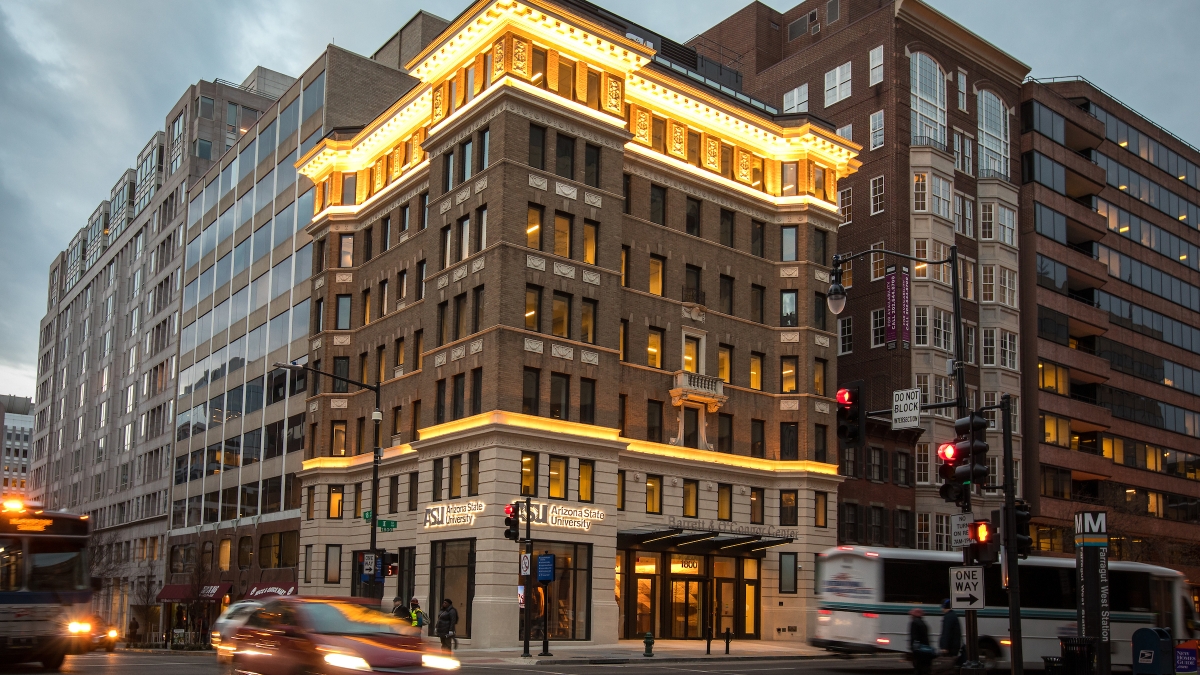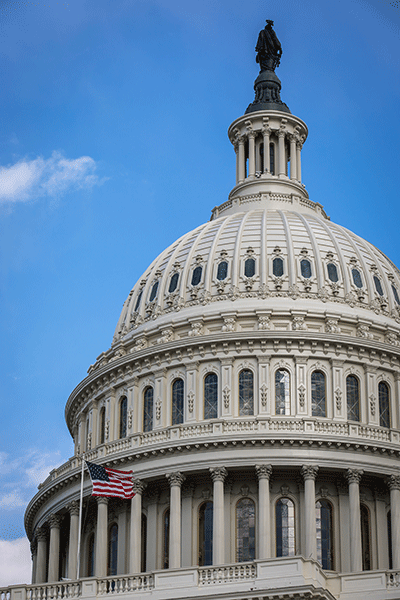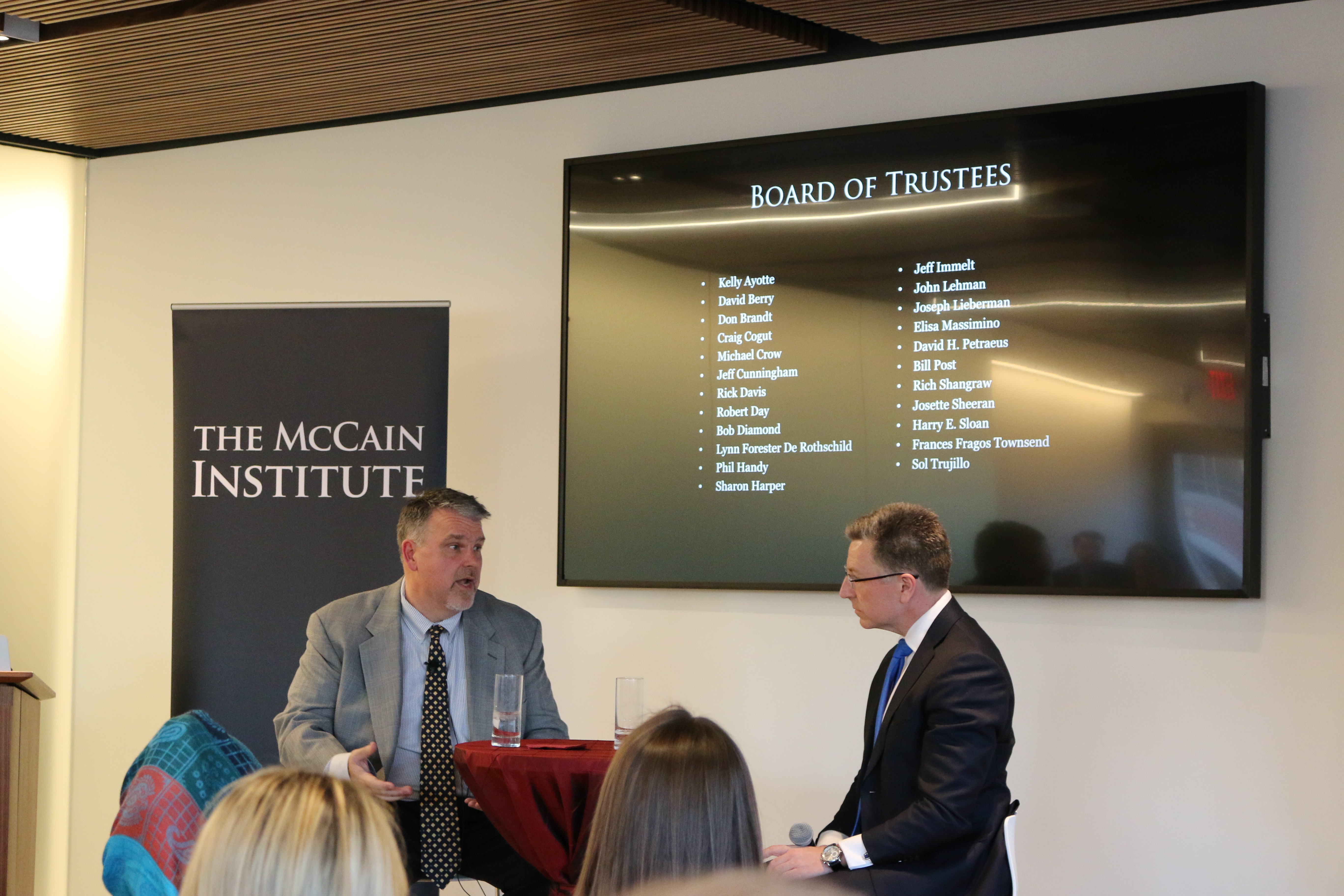Blog: Opening week at the new Barrett & O’Connor Washington Center

Editor's note: This story is being highlighted in ASU Now's year in review. Read more top stories from 2018 here.
—
Welcome to ASU Now's live-blog coverage of the opening week of the Ambassador Barbara Barrett & Justice Sandra Day O’Connor Washington Center at Arizona State University, the university's new home in Washington, D.C. You can also check out the full event schedule and see all the best photos from the week.
Day 1: Free speech, national security, covering Washington in the age of Trump
Day 2: Mission-focused research, the future of autonomous vehicles — and locusts
Day 3: Grad student research, police and trust, and terror and the rule of law
Day 4: The day's theme is international
Day 5: Educating pro athletes, educating the public, ASU's partnerships in DC, redesigning design education
***
Conversation: How Do We End Terrorism?
7:30 p.m. Monday, March 19
Nicholas Rasmussen (left) and Kurt Volker discuss how the U.S. needs to change its approach to fighting terrorism, during a discussion Monday evening at the Barrett & O'Connor Washington Center. Photo by Laura Chuckray/ASU
Nicholas Rasmussen — former director of the National Counterterrorism Center, a role he held until December 2017 — spoke with Ambassador Kurt Volker, executive director of the McCain Institute, on how the threat of terrorism has changed and how the response of the United States should evolve in turn.
“In the period after 9/11 … we often talked about terrorism as being something we could do until we won: that we would do this until the adversary was defeated, or the problem was solved. Now, I don’t look at the problem that way. I look at it as something that we will be living with in some form or fashion for the foreseeable future,” said Rasmussen. “We need to approach our strategies for our global counterterrorism with a greater degree of humility than in the past.”
McCain Institute: 5-year highlights
1:30 p.m. Monday, March 19
•52 Next Generation Leaders from 39 countries: The Next Generation Leaders program has trained and empowered 52 leaders from 39 countries through partnerships with 45 organizations.

The dome of the U.S. Capitol in Washington, D.C. Photo by Charlie Leight/ASU Now
•5 Sedona Forums convened: These forums have convened thought-leaders, decision-makers, action-activists and diverse experts to discuss approaches and solutions to real-world problems ranging from cybersecurity to China, and from crises in the Middle East to human trafficking. Featured speakers have included former Vice President Joe Biden, former Prime Minister Tony Blair, former Director of National Intelligence James Clapper, former Secretary of State Hillary Rodham Clinton, Director of National Intelligence Daniel Coats and National Security Advisor Lt. Gen. H.R. McMaster.
•120 students educated and engaged through the Policy Design Studio course: Ten semesters of the Policy Design Studio course have educated and engaged students in the process of crafting foreign policy. Read more: Real-world experience in a model embassy
•30 partnerships and 25 events around the country to end human trafficking: The Human Trafficking Program has educated, raised awareness and implemented innovative, action-based solutions to end human trafficking utilizing over 30 partnerships and 25 events around the country. The institute sponsors vigorous research to develop solutions to fight trafficking. To raise awareness of this insidious and destructive crime against human beings in college communities, the institute has formed the Student Alliance Against Trafficking with chapters on more than 20 campuses.
•24 debates as part of the Debate and Decision Series: This series has provided the platform for serious, candid discussions answering provocative questions, including: “Drone wars: Are we going too far?”, “Should the United States be the world’s policeman?” and “Is ISIS winning?”
•More than 500 people trained as part of the North Kivu Democracy Project: Launched in 2014, the North Kivu Democracy Project has directly trained over 500 people in candidate/campaign techniques, as well as 3,000 people through a “training of the trainers” program in the Democratic Republic of the Congo.
•39 Next Generation Professionals from the Democratic Republic of Congo and Pakistan: The institute has hosted these professionals for training and capacity building through political and legal training through the Next Generation Professionals Program, a condensed version of the McCain Institute’s leadership training curriculum, built on modules developed for the year-long Next Generation Leaders Program.
•19 working groups convened by the Human Rights and Democracy program: The program has convened bipartisan working-group meetings, providing analysis and recommendations regarding human rights, democracy and rule of law in 19 countries.
The importance of being here
12:30 p.m. Monday, March 19
Former U.S. Sen. and McCain Institute trustee Kelly Ayotte provides strategic counsel and oversight of the MCain Institute as an enterprise, with specific emphasis on the institute's Next Generation Leader and Human Rights programs. Here, she talks about the importance of ASU having a presence in Washington, D.C.
Video by Jamie Ell/ASU Now
The McCain Institute's mission
10 a.m. Monday, March 19
So what is the McCain Institute for International Leadership at Arizona State University? This is its mission statement: Guided by values that have animated the career of Sen. John McCain and the McCain family for generations, ASU’s McCain Institute is a nonpartisan do-tank dedicated to advancing character-driven global leadership based on security, economic opportunity, freedom and human dignity — in the United States and around the world.
Two more days of celebration
6:30 p.m. Sunday, March 18
Events continue this week at the new Barrett & O’Connor Washington Center in our nation’s capital.
“The McCain Institute at ASU: How Do We End Terrorism?” 5-7 p.m. Monday, March 19 — Former Homeland Security Advisor (and McCain Institute Trustee) Fran Townsend, former Director of the US National Counter-Terrorism Center Nick Rasmussen, and special guests describe the evolution of global terrorism since 9/11and discuss long-term approaches for overcoming it.
CGEST Reception, 5:30-7 p.m. Tuesday, March 20 — This event hosted by the Center for Gender Equity in Science and Technology convenes leading African-American women in STEM to provide a forum for women to strategize and build coalitions, continue discourse from previous gatherings that have led to grant-funded projects, share job announcements and explore opportunities to support and lead interagency functions.
Learn more at washingtondc.asu.edu/center-launch.
Katherine Reedy, Steven Beschloss and Penny Walker contributed to this blog. Top photo by Charlie Leight/ASU Now
More Local, national and global affairs

First-ever Taiwan Symposium at Thunderbird celebrates business, cultural connections
The investment by TSMC and other Taiwanese corporations in Arizona will reap dividends not only in thousands of new jobs but also in strengthened cultural connections and new methods of…

Study shows that trust drives successful market economies — but not in the way you may think
From fueling our cars to fulfilling daily coffee habits, the average U.S. cardholder makes 251 credit card transactions per year, according to Capital One.Each of these transactions are built…

Higher education key to US competitiveness, security
ASU President Michael Crow’s notion of universities as public service institutions — places that serve society in practical and meaningful ways to solve pressing issues of importance to the country…


